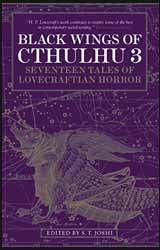|
Click here to return to the main site. Book Review
Black Wings of Cthulhu 3 (2015. 398 Pages) is another Lovecraft inspired anthology of short stories, edited by S. T. Joshi. This present volume contains seventeen stories, with an introduction by Joshi. Each short story is prefaced with some information about the author. The third volume in the series has stories which, whilst owing a debt to Lovecraft, rarely try to ape him in style or content; the authors rather taking themes of cosmic disinterest or horror and putting their own spin on it. Of course, some of the authors have gone for evocative stories of disquiet, like Caitlin R. Kiernan’s One Tree Hill (The World as Cataclysm) which on one level tells of a journalist sent to investigate an unusual lightening strike on a tree, however he discovers that a lot more is happening than he first thought. Taking the middle ground of creeping horror, attached to actual death or dismemberment, Jonathan Thomas’s Houdini Fish gives us a cautionary tale that some things are best left buried, as does Richard Gavin’s The Hag Stone. Whereas Mollie L. Burlson’s Hotel del Lago is very reminiscent of the type of stories which use to be presented in The Night Gallery, stopping off in a hotel, in a strange town, where even stranger things are happening, or are they? At the other end of the spectrum, Donald R. Burleson’s Dimply Dolly Doofy reconfirms to anyone who has seen Trainspotting that even babies can be as creepy as hell. Don Webb’s The Megalith Plague presents a form of retelling of The Wicker Man set in Texas even to the point of cheekily referencing the film within the short story. Of course, not all of the stories fall into these three convenient categories. Underneath an Arkham Moon, by Jessica Amanda Salmonson & W. H. Pugmire, presents a tale from the perspective of the demons which plague most of the other stories, and Spiderwebs in the Dark, by Darrell Schweitzer, could almost be considered a straightforward science fiction story, with horrific elements. As could Waller, by Donald Tyson, who sends his cancer ridden protagonist through the doorways between dimensions to discover that his cancer serves a strange purpose. They are both nice inclusions as many writers focus on the horror aspects of Lovecraft’s writings and all too often forget that he was also working on a cosmic scale. Jason V. Brock’s The Man with the Horn takes Lovecraft’s idea that the universe is weirder than humans could imagine and if seen would feel like madness. Likewise, Sam Gafford’s Weltschmerz introduces us to the nihilistic Doug convinced that life holds little meaning, who has a chance encounter with Maya, who shows him the true meaning of meaninglessness. Many of the more horrific aspects of the stories draw on the fear of change, but this is not so with both Lois Gresh’s Necrotic Cove, where transformation is also a conduit to revelation, and Mark Howard Jones’s The Turn of the Tide, which highlights the inevitability of change - something which shouldn’t always evoke fear. The penultimate story, Thistle’s Find by Simon Strantas, is another cautionary tale about the dangers of messing around with things you don’t understand. The book closes with Brian Stableford's Further Beyond, which brings us back, full circle, to where it all began in Providence. Overall, it’s a strong collection, if for nothing else, that few of the writers tried to ape Lovecraft’s style or content. The general lack of stories about creeping horror, which end with the reveal of a giant calamari, only adds to the pleasure of the collection. 8 Charles Packer Buy this item online
|
|---|


